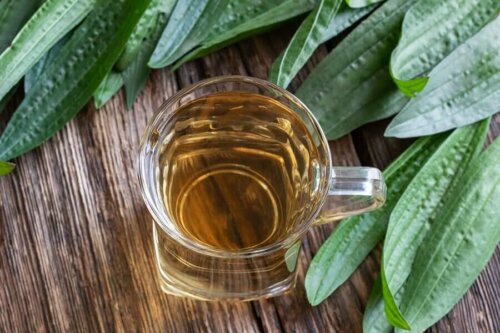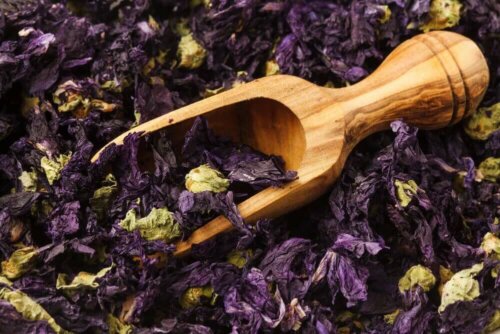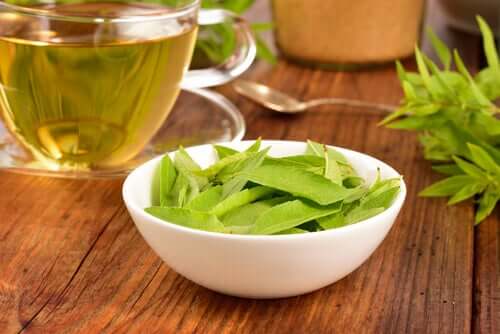Discover the Seven Best Laxative Herbs

Constipation is a problem that affects thousands of people. Processed food, refined flour, and stress are some of its main causes. However, there are some laxative herbs that can help to combat mild cases of constipation.
In most cases, treatment of constipation mainly consists of making changes to your diet. This includes increasing your intake of fiber and probiotics. Your doctor may also recommend taking laxatives, supplements, or medication.
While you can use medicinal laxative herbs for some home remedies, the best thing to do is talk to your doctor to determine the most appropriate course of treatment. In that way, you’ll not only relieve any symptoms, but you’ll also be able to reduce the risk of constipation reoccurring in the future.
Constipation: what you need to know
Many of your daily habits can trigger a number of different imbalances in your body. One of them is constipation, a condition produced by your intestines not functioning properly.
When they’re inefficient or are full of unhealthy food and waste, you may find you’re unable to go to the bathroom. As a result, in addition to increased bloating and stomach upsets, waste gets trapped and can trigger other health problems.
Bowel movements shouldn’t require too much effort and stools should be soft. If not, you’re suffering from constipation. Although it’s usually sporadic, in some cases it can become chronic.
If you want to learn more, read: 5 Remedies that Can Help You Relieve Constipation
Laxative herbs: which are the best?
To be able to go to the bathroom once or twice a day, you need to eat a healthy diet that includes fruit, vegetables, and legumes and avoid pastries and processed and fried foods, as confirmed by gastroenterology experts.
It’s also essential to drink around two liters of water a day and make sure you exercise. At the same time, to help your body get rid of waste, you can take advantage of the powers of certain laxative herbs and plants.
While there’s insufficient scientific evidence to support the use of these alternative remedies, there are some studies that suggest they may be beneficial for regulating gastrointestinal activity. They may also help to reduce feelings of fullness and bloating.
However, it’s important to be aware that they won’t be suitable for all cases. Moreover, taking excessive quantities could cause adverse side effects. So, before trying any of these home remedies, it’s best to consult with your doctor to find out which you should avoid and how much of each you should take.
1. Plantain leaves
The leaves of this tree contain large amounts of mucilage, which can help if you’re suffering from constipation, dyspepsia, and irritation of the stomach lining. This was detailed in an article published in the Electronic Physician Journal.

Ingredients
- 1 tablespoon of plantain leaves (10 g).
- 1 cup of water (250 ml).
Method
- Put the water and plantain leaves in a pot.
- Put on low heat until it starts to boil.
- Remove from heat and let it stand for 5 minutes.
- Strain and drink immediately.
- Drink twice a day (once before bed).
2. Nettle
There’s insufficient scientific evidence to support the supposed laxative properties of nettle. Nevertheless, natural medicine claims it stimulates the digestive system. It’s also been suggested that it may help to regulate gut microflora, which is essential when it comes to combating constipation.
Ingredients
- 1 tablespoon of nettle leaves (10 g).
- 1 cup of water (250 ml).
Method
- Place the water and nettle leaves in a pan.
- Heat, and once it boils, turn the heat down and let simmer for 5 minutes.
- Remove from the heat and let it stand for 5 minutes.
- Strain and drink.
- Drink up to 3 cups a day (one on an empty stomach, and the others half an hour before lunch and dinner).
3. Licorice leaves
Licorice is a natural way to combat heartburn and help eliminate the build-up of waste in the intestines.
According to an investigation published in the Pakistan Journal of Pharmaceutical Sciences, licorice contains a substance known as glycyrrhizin, which has laxative and anti-inflammatory properties.
However, it’s not a good idea to use this home remedy for more than two consecutive weeks, as it could cause fluid retention or increase your blood pressure. It’s also unsuitable for diabetics.
Ingredients
- 1 tablespoon of licorice leaves (10 g).
- 1 cup of water (250 ml).
Method
- Heat the water and licorice leaves in a pan for 10 minutes.
- Remove from the heat, cover, and let it stand for 5 minutes.
- Strain and drink.
- Drink up to 3 cups a day (one on an empty stomach and the others after meals).
4. Mallow
According to popular belief, it’s said that mallow prevents constipation, aids digestion, and even calms stomach pain, and prevents cramps.
Furthermore, an investigation published in Biomedicine and Pharmacotherapy determined that the Malva sylvestris aqueous extract (MSAE) present in mallow increases intestinal motility and water intestinal secretion. This helps to relieve constipation.

Ingredients
- 1 tablespoon of mallow leaves (10 g).
- 1 cup of water (250 ml).
Method
- Heat the water, and once boiling, pour it into a cup.
- Add the mallow leaves and cover.
- After 10 minutes, uncover and strain.
- Drink before it cools.
- Drink up to three cups a day.
You might also like to read: Marshmallow Root: Benefits and Side Effects
5. Prickly pear
Though you may not consider it an herb because of its shape (it looks a bit like a cactus), prickly pear is a plant that’s worth trying if you suffer from constipation. It’s thought that it can increase the volume and frequency of bowel movements.
Ingredients
- 1 prickly pear.
- 2 cups of water (500 ml).
Method
- Heat the water and, once boiling, add the prickly pear.
- Remove from the heat and let it stand for 10 minutes.
- Remove the prickly pear and drink the tea over the course of one day.
6. Verbena
Verbena extract is known for its antispasmodic properties. While it’s useful for treating diarrhea, it can also be used to combat constipation. In fact, in general, it helps to balance gastrointestinal activity and promotes the elimination of waste.

Ingredients
- 2 tablespoons of verbena leaves (20 g).
- 1 cup of water (250 ml).
Method
- Boil the water and add the verbena leaves.
- Remove from the heat and let it stand for 10 minutes.
- Strain and drink.
- Drink a cup on an empty stomach and another before bed.
7. Olive leaves
The leaves of this well-known Mediterranean tree apparently have the ability to relieve constipation. In fact, according to information published in Evidence-based Complementary and Alternative Medicine, they’re anti-inflammatory and can help to reduce gut discomfort.
Ingredients
- 2 tablespoons of olive leaves (20 g).
- 2 cups of water (500 ml).
Method
- Heat the water, and once boiling, add the olive leaves.
- Boil for 5 minutes, remove from the heat and let it stand for 5 minutes.
- Strain and drink a cup on an empty stomach and another half an hour after lunch.
Conclusion on laxative herbs
There are several laxative herbs that can help to relieve constipation. Nevertheless, it’s important to be aware that they can cause side effects. What’s more, evidence proving their effectiveness is limited.
Remember, if you’re suffering from symptoms of constipation, you must consult with your doctor to discuss the different treatment options for you.
All cited sources were thoroughly reviewed by our team to ensure their quality, reliability, currency, and validity. The bibliography of this article was considered reliable and of academic or scientific accuracy.
- Wang X, Yin J. Complementary and Alternative Therapies for Chronic Constipation. Evid Based Complement Alternat Med. 2015;2015:396396. doi:10.1155/2015/396396
- López san román , A, Moreira, V.F. Estreñimiento. Revista Española de Enfermedades Digestivas. 2006;98(4)
- Ara roldán, A. Las 40 plantas medicinales más populares Una guía práctica y completa de sus virtudes terapéuticas y recetario. (4th ed.).Spain: ; 1994.
- Najafian Y, Hamedi SS, Farshchi MK, Feyzabadi Z. Plantago major in Traditional Persian Medicine and modern phytotherapy: a narrative review. Electron Physician. 2018;10(2):6390–6399. Published 2018 Feb 25. doi:10.19082/6390
- Dastagir, G., & Rizvi, M. A. (2016, September 1). Glycyrrhiza glabra L. (Liquorice). Pakistan Journal of Pharmaceutical Sciences. Pakistan Journal of Pharmaceutical Sciences.
- Fenwick, G. R., Lutomski, J., & Nieman, C. (1990). Liquorice, Glycyrrhiza glabra L.-Composition, uses and analysis. Food Chemistry, 38(2), 119–143. https://doi.org/10.1016/0308-8146(90)90159-2
- Jabri, M. A., Wannes, D., Hajji, N., Sakly, M., Marzouki, L., & Sebai, H. (2017). Role of laxative and antioxidant properties of Malva sylvestris leaves in constipation treatment. Biomedicine and Pharmacotherapy, 89, 29–35. https://doi.org/10.1016/j.biopha.2017.02.020
- Sisay M, Bussa N, Gashaw T. Evaluation of the Antispasmodic and Antisecretory Activities of the 80% Methanol Extracts of Verbena officinalis L: Evidence From In Vivo Antidiarrheal Study. J Evid Based Integr Med. 2019;24:2515690X19853264. doi:10.1177/2515690X19853264
- Hashmi MA, Khan A, Hanif M, Farooq U, Perveen S. Traditional Uses, Phytochemistry, and Pharmacology of Olea europaea (Olive). Evid Based Complement Alternat Med. 2015;2015:541591. doi:10.1155/2015/541591
This text is provided for informational purposes only and does not replace consultation with a professional. If in doubt, consult your specialist.








